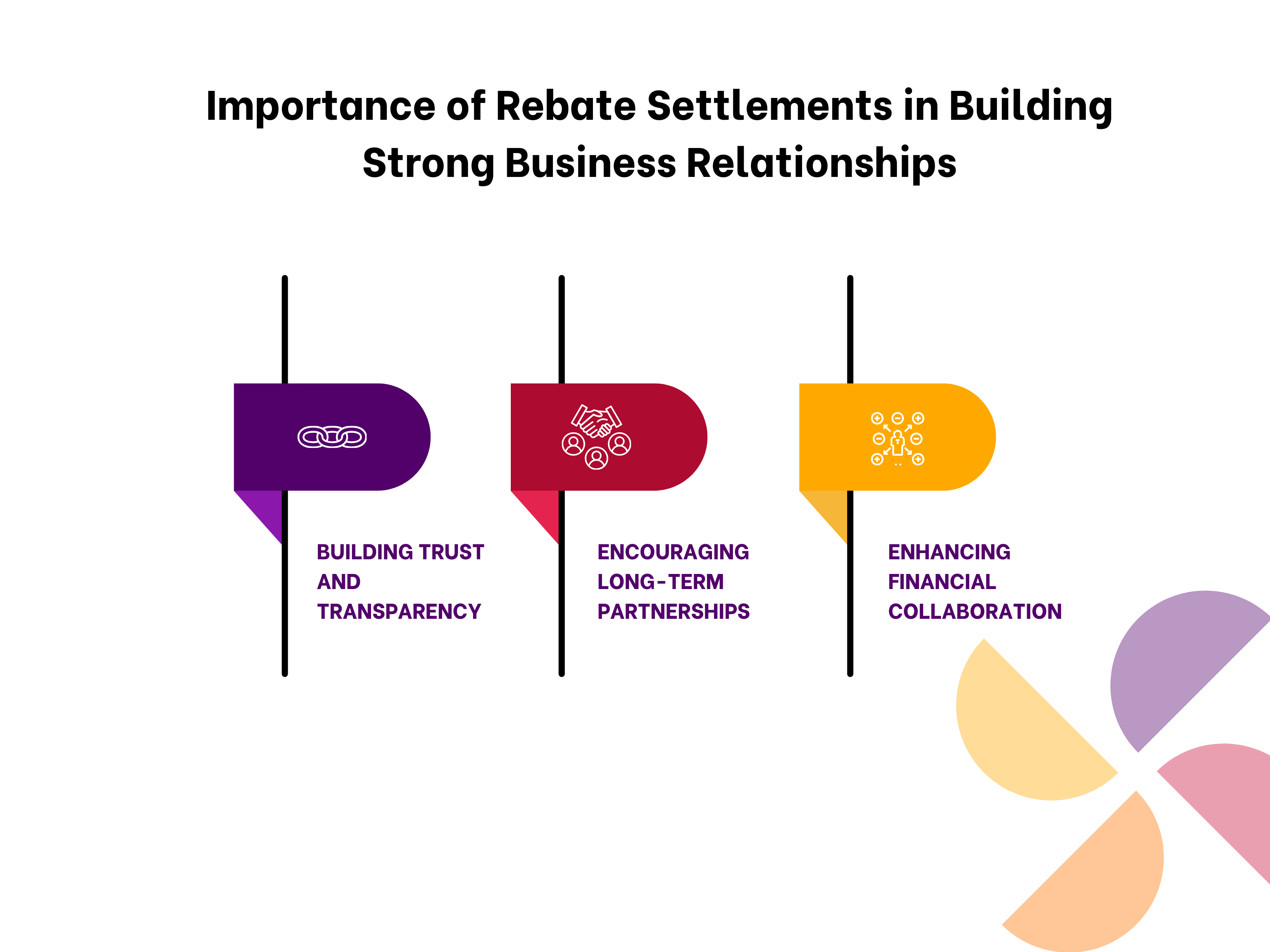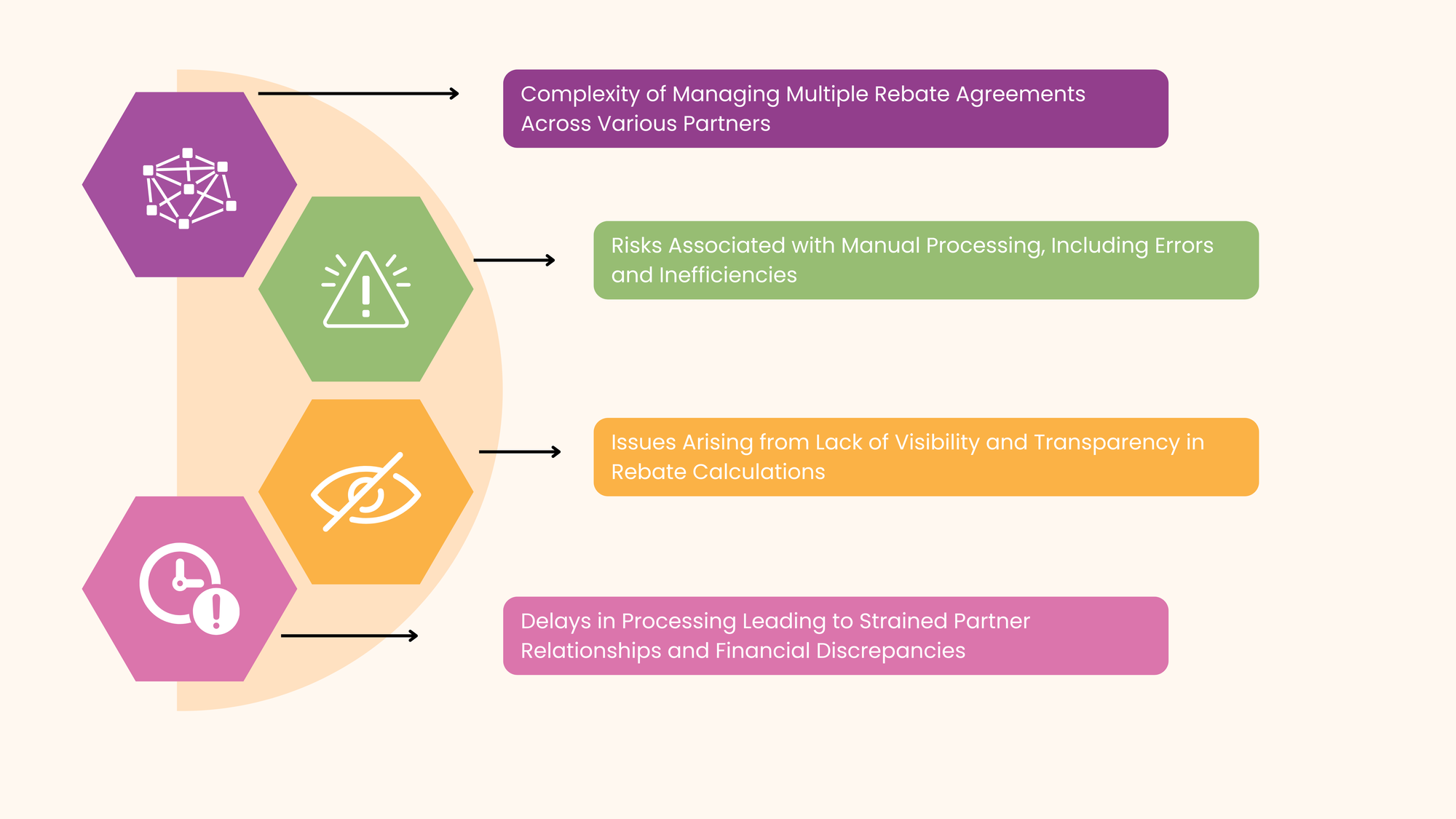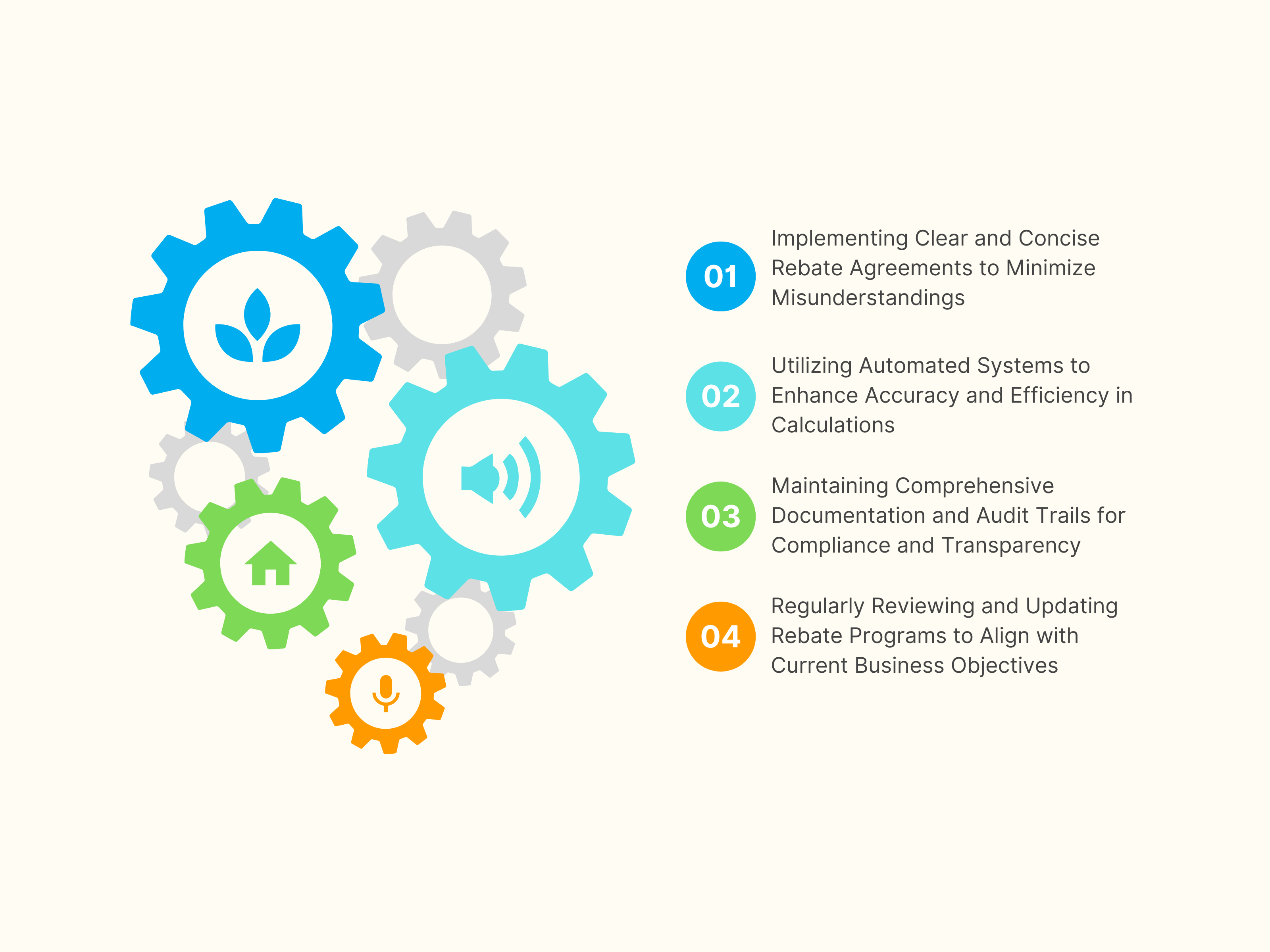How to Master Rebate Settlements?

Rebate settlements play a crucial role in ensuring that businesses accurately process and disburse financial incentives owed to their trading partners. Unlike general rebate management, which focuses on structuring and tracking rebate programs, rebate settlement specifically deals with the finalization and distribution of payments. When handled efficiently, this process strengthens business relationships, enhances financial transparency, and minimizes disputes.
However, many companies struggle with rebate settlements due to manual processes, miscalculations, and a lack of visibility. Errors in settlement calculations or delays in payments can lead to financial discrepancies and strained partnerships. In today’s competitive environment, businesses need streamlined, accurate, and transparent rebate settlement processes to maintain trust and optimize financial performance.
This blog explores the key aspects of rebate settlements, common challenges businesses face, best practices for improvement, and the role of technology in making settlements more efficient.
Table of Contents:
- What are Rebate Settlements?
- Importance of Rebate Settlements in Building Strong Business Relationships
- Common Challenges in Rebate Settlement Processes
- Best Practices for Streamlining Rebate Settlements
- Leveraging Technology for Enhanced Rebate Management
Jump to a section that interests you, or keep reading.
What are Rebate Settlements?
A rebate settlement is the process of finalizing and disbursing accumulated rebate amounts to trading partners based on the terms outlined in prior agreements. This process involves calculating the total rebates earned over a specific period, generating settlement documentation, and executing payments or credits accordingly. Rebate settlements are essential components of business agreements, ensuring that both parties honor their financial commitments and maintain accurate financial records.
Importance of Rebate Settlements in Building Strong Business Relationships
Effective management of rebate settlements plays a pivotal role in strengthening business relationships:

-
Building Trust and Transparency: Consistently honoring rebate agreements and ensuring timely settlements demonstrates a company's commitment to fair dealings, fostering trust between trading partners.
-
Encouraging Long-Term Partnerships: Well-structured rebate programs incentivize partners to maintain or increase their purchasing commitments, promoting sustained collaboration and mutual growth.
-
Enhancing Financial Collaboration: Clear and efficient rebate settlements facilitate better financial planning and cash flow management for both parties, leading to more stable and cooperative business interactions.
Common Challenges in Rebate Settlement Processes

Managing rebate settlements involves navigating a series of intricate challenges that can impact financial accuracy and partner relationships.
Complexity of Managing Multiple Rebate Agreements Across Various Partners
Businesses often engage with numerous trading partners, each governed by distinct rebate agreements tailored to specific objectives such as volume incentives, performance targets, or product promotions. The diversity and number of these agreements introduce significant complexity:
-
Diverse Terms and Conditions: Each agreement may have unique terms, including varying calculation methods, performance thresholds, and timelines, making standardized management difficult.
-
Resource-Intensive Oversight: Monitoring compliance and performance across multiple agreements demands substantial administrative effort and coordination.
Without a centralized system to manage these agreements, organizations risk overlooking critical details, leading to potential financial losses and strained partner relations.
Risks Associated with Manual Processing, Including Errors and Inefficiencies
Reliance on manual methods, such as spreadsheets and email communications, for rebate settlement processing is fraught with challenges:
-
Prone to Human Error: Manual data entry and calculations increase the likelihood of mistakes, resulting in inaccurate rebate amounts and potential disputes.
-
Time-Consuming Processes: Manual workflows are inherently slow, delaying settlements and diverting resources from strategic tasks.
-
Scalability Issues: As the volume of rebate agreements grows, manual systems become increasingly unmanageable, hindering organizational growth.
These inefficiencies not only affect financial outcomes but also damage the organization's reputation and reliability.
Issues Arising from Lack of Visibility and Transparency in Rebate Calculations
Transparency is crucial for trust and accuracy in rebate settlements. A lack of clear visibility can lead to several problems:
-
Uncertainty and Mistrust: Without accessible and understandable rebate data, partners may question the fairness and accuracy of settlements.
-
Difficulty in Tracking Obligations: Opaque processes make it challenging to monitor what has been paid versus what is owed, complicating financial planning.
-
Compromised Decision-Making: Limited insight into rebate performance hampers the ability to assess the effectiveness of rebate programs and make informed adjustments.
Implementing transparent systems is essential to mitigate these issues and foster collaborative partnerships.
Delays in Processing Leading to Strained Partner Relationships and Financial Discrepancies
Timely processing of rebate settlements is vital for maintaining healthy business relationships and financial accuracy. Delays can result in:
-
Cash Flow Interruptions: Late payments can disrupt partners' financial planning and operations, leading to dissatisfaction.
-
Erosion of Trust: Consistent delays signal unreliability, potentially causing partners to reconsider the business relationship.
-
Financial Reporting Inaccuracies: Postponed settlements can lead to misstatements in financial records, affecting compliance and strategic decisions.
Addressing processing inefficiencies is crucial to avoid these negative outcomes and ensure smooth operations.
Best Practices for Streamlining Rebate Settlements

Efficient rebate settlement processes are essential for maintaining accurate financial records and fostering strong relationships with trading partners. Implementing the following best practices can significantly enhance the efficiency and accuracy of your rebate settlements.
Implementing Clear and Concise Rebate Agreements to Minimize Misunderstandings
Establishing well-defined rebate agreements is fundamental to preventing disputes and ensuring smooth settlements. Key considerations include:
-
Detailed Terms and Conditions: Clearly outline the specifics of the rebate program, including eligibility criteria, calculation methods, performance thresholds, and timelines. This clarity helps all parties understand their obligations and expectations.
-
Consistent Terminology: Use uniform language across all agreements to avoid confusion. Consistency in terms reduces the risk of misinterpretation and errors during the settlement process.
-
Regular Communication: Engage in ongoing dialogue with trading partners to address any questions or concerns promptly. Regular communication fosters transparency and trust, which are crucial for effective collaboration.
By prioritizing clarity and precision in rebate agreements, businesses can minimize misunderstandings and lay the groundwork for efficient settlement processes.
Utilizing Automated Systems to Enhance Accuracy and Efficiency in Calculations
Leveraging technology to automate rebate calculations and settlements can lead to significant improvements in accuracy and operational efficiency:
-
Automated Calculations: Implementing specialized rebate management software ensures that calculations are performed consistently and accurately based on predefined agreement terms, reducing the likelihood of human error.
-
Streamlined Workflows: Automation facilitates the seamless execution of tasks such as payment calculations, settlement creation, and data uploads, freeing up valuable time for strategic activities.
-
Real-Time Data Access: Automated systems provide up-to-date information on amounts owed and payments made, enhancing financial visibility and supporting informed decision-making.
Adopting automated solutions not only improves accuracy but also accelerates the rebate settlement process, benefiting both the organization and its trading partners.
Maintaining Comprehensive Documentation and Audit Trails for Compliance and Transparency
Thorough documentation and robust audit trails are essential for ensuring compliance with regulatory standards and promoting transparency:
-
Centralized Record-Keeping: Store all rebate-related documents, including agreements, transaction records, and communications, in a centralized repository accessible to authorized personnel.
-
Detailed Audit Trails: Maintain logs of all actions taken during the rebate settlement process, capturing information such as who performed each action and when. This practice aids in tracking changes and identifying discrepancies.
-
Regular Audits: Conduct periodic reviews of rebate settlements to verify accuracy, ensure adherence to agreement terms, and identify areas for improvement.
Comprehensive documentation and diligent auditing not only facilitate compliance but also build confidence among trading partners regarding the integrity of the rebate settlement process.
Regularly Reviewing and Updating Rebate Programs to Align with Current Business Objectives
To maintain the relevance and effectiveness of rebate programs, it is crucial to periodically assess and adjust them in line with evolving business goals:
-
Performance Analysis: Evaluate the outcomes of existing rebate programs to determine their impact on sales, profitability, and partner engagement.
-
Stakeholder Feedback: Solicit input from internal teams and trading partners to gain insights into the effectiveness of current rebate structures and identify areas for enhancement.
-
Market Alignment: Ensure that rebate programs are responsive to market trends, competitive dynamics, and changes in consumer behavior.
-
Documented Updates: Clearly document any modifications to rebate agreements and communicate these changes promptly to all relevant parties to maintain transparency and alignment.
Regularly reviewing and updating rebate programs ensures they remain strategic tools that support the organization's objectives and adapt to the changing business landscape.
Leveraging Technology for Enhanced Rebate Management
In today's fast-paced business environment, effectively managing rebate settlements is crucial for maintaining financial accuracy and fostering strong relationships with trading partners. The adoption of advanced rebate management software has revolutionized this process, offering tools that streamline operations and provide valuable insights.
Overview of Modern Rebate Management Software Solutions and Their Features
Modern rebate management software is designed to automate and optimize the complexities involved in rebate settlements. Key features of these solutions include:
-
Automation of Rebate Calculations and Applications: These systems automatically compute rebate amounts based on predefined agreements, ensuring accuracy and reducing manual errors.
-
Integration with Business Systems: Seamless connectivity with Enterprise Resource Planning (ERP) and Customer Relationship Management (CRM) systems allows for synchronized data flow, enhancing consistency and reducing redundant data entry.
-
Real-Time Data Processing and Visibility: Users gain immediate insights into rebate program performance, enabling proactive management and swift decision-making.
-
Centralized Data Repository: All rebate-related information is stored in a unified system, facilitating easy access, improved collaboration among departments, and consistent process adherence.
-
Compliance and Audit Support: Comprehensive audit trails and automated record-keeping assist in meeting regulatory requirements and reducing compliance risks.
Benefits of Integrating Technology, Such as Real-Time Tracking and Reporting
Incorporating advanced technology into rebate management offers several advantages:
-
Enhanced Financial Visibility: Real-time tracking provides up-to-date information on rebate accruals and settlements, aiding in accurate forecasting and budgeting.
-
Operational Efficiency: Automation streamlines workflows, reducing manual tasks and freeing staff to focus on strategic initiatives.
-
Improved Accuracy: Automated calculations minimize human errors, ensuring precise rebate settlements and reducing disputes.
-
Strengthened Partner Relationships: Transparent and efficient rebate processes build trust with trading partners, leading to more collaborative and mutually beneficial relationships.
-
Compliance Assurance: Detailed audit trails and automated compliance checks help adhere to industry regulations, mitigating the risk of non-compliance penalties.
Conclusion
Rebate settlements are a critical aspect of business operations that require precision, efficiency, and transparency. Without a well-structured settlement process, businesses risk financial mismanagement, partner disputes, and operational inefficiencies. By addressing common challenges such as manual processing errors, unclear agreement terms, and delayed payments, organizations can create a more streamlined and reliable rebate settlement system.
Implementing best practices—such as clear agreement terms, automation, comprehensive documentation, and regular program reviews—can significantly improve the accuracy and efficiency of rebate settlements. Additionally, leveraging modern rebate management software provides real-time tracking, automated calculations, and compliance support, further reducing risks and enhancing financial control.
As businesses continue to prioritize data-driven decision-making and operational efficiency, investing in better rebate settlement strategies will lead to stronger partner relationships, improved cash flow management, and long-term financial stability. By taking control of rebate settlements today, companies can build a more transparent and efficient financial framework for the future.
